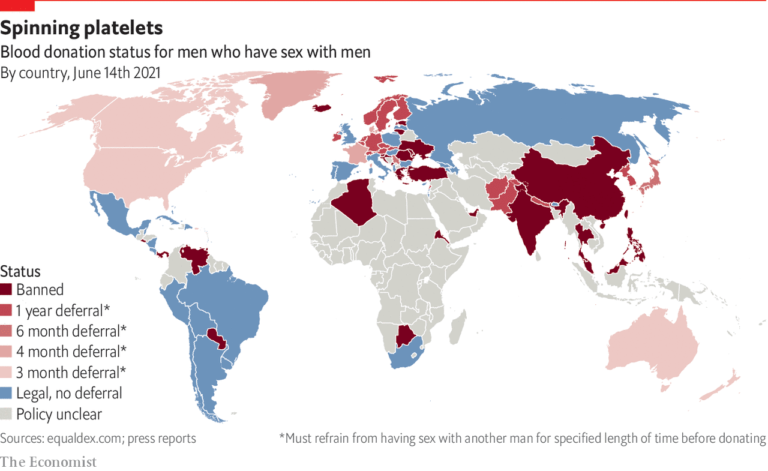

IN 1983 BRITAIN’S National Blood Transfusion Service released a pamphlet entitled “AIDS and how it concerns blood donors”. It described how the disease attacks the immune system and listed the groups most at risk, including gay men who had several sexual partners and intravenous drug users. Much was still unclear, though: the authors suspected that AIDS was caused by a virus but it was “not known for certain”; they reckoned it could “almost certainly” be passed on through blood and blood products. There was no screening that the service could provide to detect infections, so “until there is and more is known…donors are asked not to give blood if they think they may either have the disease or be at risk from it”. Restrictions have lingered for decades on blood donations from men who have sex with men. But on June 14th Britain switched to an individual risk-assessment system for all donors.
Even as scientists have learned more about HIV/AIDS—it is transmitted via bodily fluids and can afflict people of any sexuality—many countries have remained cautious about blood donation by gay and bisexual men. In the 1980s and 1990s, after thousands of people were infected with HIV via products made from donated blood, health services introduced formal policies that excluded donors who engaged in “high-risk behaviour”. These ranged from outright bans to “deferral periods” (ie, a man must refrain from having sex with another man for months, if not years, before donating.) In effect, these deferral periods amount to bans by proxy. LGBT activists argue that such measures are homophobic.
Today the risk of transmitting HIV through the blood supply is negligible, because knowledge of HIV prevention, testing and management has deepened. People who have HIV but are on antiretroviral drugs cannot pass on the disease. Every blood donation is swiftly and accurately tested for the virus: the leading tests have a median “window period”—the time following the initial infection during which the virus may be undetectable—of only 18 days.
Many countries are relaxing their rules as a result. Brazil, Italy, Poland, Russia and South Africa, among others, have already done away with sexuality-based deferrals (see map). Covid-19 has also increased the demand for blood products and encouraged countries to reassess their policies, or at least to shorten deferral periods. In America, where community blood-donation drives were cancelled during the first wave of the pandemic, the deferral period was dropped from 12 to three months in April 2020. New Zealand did the same in December and Australia followed suit in January.
Reducing or ending deferral periods may help combat the stigma still associated with HIV and AIDS. Crucially, it will also increase the amount of blood available for patients in need. A study conducted in 2014 by the Williams Institute, a think-tank which studies sexual orientation and public policy, found that lifting bans and restrictions on men who have sex with men would increase the annual blood supply in America by between 2% and 4%. A report in Britain by FAIR (For the Assessment of Individualised Risk), a steering group set up by the Department of Health and Social Care, found that LGBT people were more likely to encourage others to donate under the new policy.